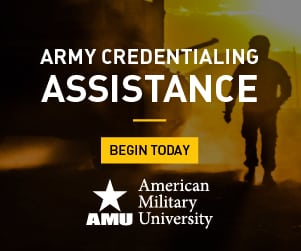by Col. Phil McNair
Vice President for Strategic Initiatives, American Public University System
June is PTSD Awareness Month, and considering the fact that many members of the military, not to mention their family members, suffer from PTSD symptoms, this seems like a good time to talk about something few others have: PTSD and online education.
by Craig Gilman
Faculty member at American Military University
June is Post-Traumatic Stress Disorder (PTSD) Awareness Month. Recent focus has centered on our deserving veteran population due to the increasing number of veterans returning from often harrowing experiences in Afghanistan, Iraq and elsewhere. However, traumatic events, such as natural disasters, serious accidents, terrorist attacks, assault and childhood abuse and neglect can lead to PTSD in anyone in our own communities here at home.
by Bradley Hood, Student Contributor
American Military University
Like many prospective military students, I have asked myself “Do I have the time to tackle the studying and exams that accompany taking college courses?”. In January of 2011 I was assigned to 6 weeks of active duty for training to achieve a new MOS designation. I had just completed a little over half of my Bachelor’s degree at American Military University, and I was eager to complete the rest as soon as possible. I had a choice to make: Either take a break from school, or sacrifice my free time to knock out a couple more classes. I chose the latter option.
For the past five years, forensic scientists have been taking advantage of their ability to collect Touch DNA, small samples of DNA from evidence that has been handled by suspects. However, new research has found that bacteria may be the next generation of forensic evidence used in police investigations. Learn more about key research studies focused on the benefits and feasibility of using bacterial fingerprints as evidence.
By Dr. Gary Minor
Beginning in the mid-1980s, states nationwide began changing domestic violence laws and the criminal justice community began treating domestic violence on the same level as violence involving strangers. To accommodate these legislative changes, police agencies have had to refine how they investigate domestic violence cases. AMU criminal justice professor Gary Minor highlights two sets of questions that officers should ask victims to help build a case against an abuser.
By Brett Daniel Shehadey Special Correspondent for In Homeland Security The 21st century will be a trying time for…
This week, two innocent victims were shot dead while performing a seemingly non-dangerous profession. A third victim was also injured. This time the victims were news reporters; reporting from a small city in the middle of Virginia. Has this senseless violence become the new reality in America?
By John Ubaldi
Contributor, In Homeland Security
Former National Security Adviser Brent Scowcroft gave President Obama a much needed boost by endorsing his Iran nuclear agreement, and pressed Congress to endorse it.
During the unprecedented global coronavirus pandemic, children and adults are forced to find new ways to stay fit.
